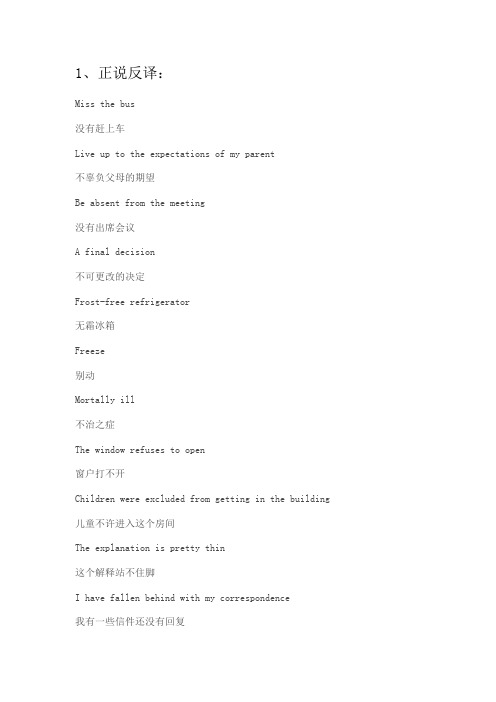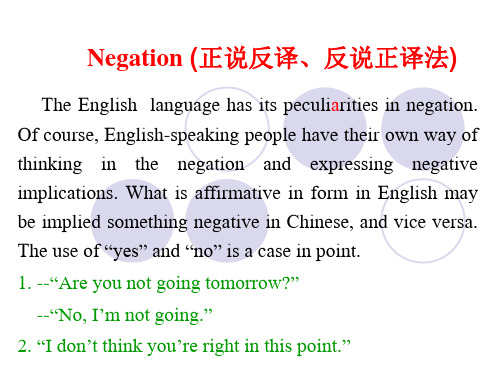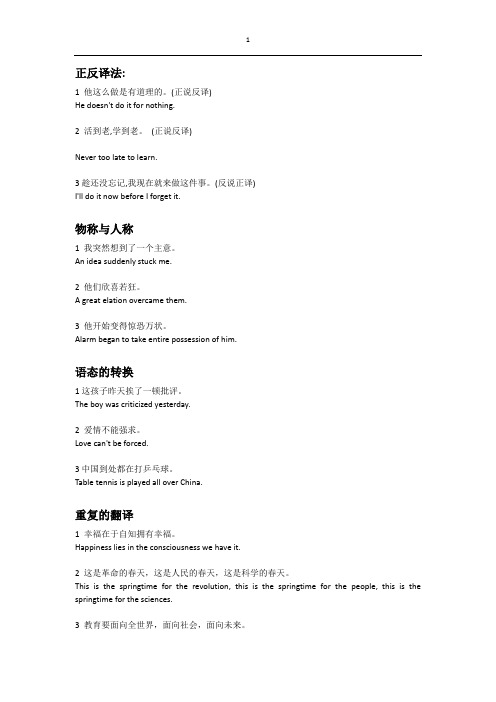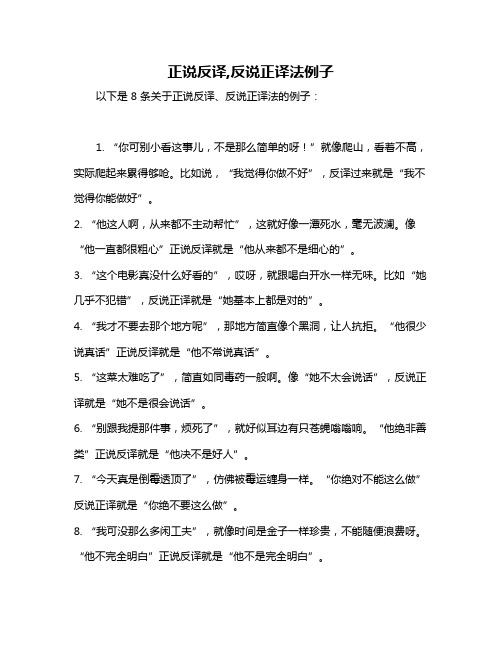句子翻译_正说反译、反说正译
翻译技巧 之正说反译与反说正译

e.g. 800 people had been saved by the organization.
组织拯救了800人.
3、翻译成汉语判断句:不突出被动动 作,而着重于对事 物的状态、过程和性 质等加以描述,经常采用“是……的” 判断句。
e.g. This kind of device is much needed in the mechanical watch-making industry.
我一时想不起来这个名字。
2.Negative in English, Affirmative in Chinese 反说正译
e.g. My overcoat would not wear out.
我的大衣十分耐穿。
3.Double Negative for Emphasis 双重否定为强调
e.g. He was no small reputation as a scientist.
这种装置在机械表制造业中是很重要的。
4、把被动句中的“被”字用其它字替 代:“被”— “受、遭、让、由、得以、 受到、遭到、为……所”等。
e.g. The proposal on the improvement of the investment environment is accepted by all the members of the committee.
这条关于改善投资环境的建议为该委员会 全体委员所接受。
5、被动惯用句型:泛指我们、人们、 有人、大家等。
有人认为...
e.g. It is believed that almost all sudden deaths are caused by damage to the heart.
正说反译

1、正说反译:Miss the bus没有赶上车Live up to the expectations of my parent不辜负父母的期望Be absent from the meeting没有出席会议A final decision不可更改的决定Frost-free refrigerator无霜冰箱Freeze别动Mortally ill不治之症The window refuses to open窗户打不开Children were excluded from getting in the building 儿童不许进入这个房间The explanation is pretty thin这个解释站不住脚I have fallen behind with my correspondence我有一些信件还没有回复Fully clothes, he fell across his bunk and was instantly sleep 衣服也不脱,他往床上横着一倒,不一会儿就睡着了Don’t lose time in posting this letter不要忘了寄这封信No deposit will be refunded unless ticket produced凭票退押金例1:原文:她忍住了没有笑出声。
译文:She refrained from laughing.例2:原文:花园根本无人整理。
译文:The garden was in a state of total neglect.例3:原文:我不能忍受你的脾气。
译文:Your temper is more than I can bear.例4:原文:他宁死不屈。
译文:He would die before yielding.例5:原文:生活远非净是乐事。
译文:Life is far from being a bed of roses.例6:原文:风景美得无以言表。
句子翻译(3)

Exercises: 1) The world today is far from peaceful. 今天的世界还很不安宁。 2) The evidence is conclusive, excluding all possibilities of doubt. 证据确凿,毋庸置疑。 3) Mr. White has refrained from making any official comment on the coup in that country. 怀特先生并没有对该国的政变发表正式评论。 4) That served to strengthen instead of weaken our determination. 那件事没有削弱我们的决心,反倒增强了我们的决 心。
(5) can/could not + 比较级 1) I couldn’t feel better. 我觉得身体好极了。 2) I couldn’t agree with you more. 我太赞成你的看法了。
(6)其他 1) If that isn’t what I want! 我想要的就是这个呀! 2) He can’t see you quickly enough. 他很想尽快和你见面。
4) The pollution problem should be solved in good time. 污染问题应及时加以解决。 5) We were very much impressed by what she had said. 我们为她的言语深深打动。
(2) 译成汉语主动句 1) 保存原文主语 • This project should be finished as soon as possible. 这项工程应该尽早完成。 • This must be made clear to everybody. 这一点必须向大家讲明白。
与翻译有关的那些--反译法剖析

正说反译法(短语)
某些固定短语一般要译作否定:
far from; free from; prevent… from; protect from….
but for; but that; anything but; cannot but.
other than; rather than; more than…can; 比较级+ than to do
我们要永远对生活抱乐观态度。
5. His pronunciation is no better than mine.
他的发音和我的一样糟糕。
英语、汉语中都有从正面或反面 来表达一种概念的现象。
这里所谓正面表达和反面表达,
主要是指在英语中是否用
“no,not,never”或“de-, dis-, non-, im-, in-,un-,-less”等否定性词缀的 词;在汉语中是否用“不、非、无、
His hesitation led to his failure. • 他不果断/犹豫不决导致了他的失败。
正说反译法(虚词:介词)
To do this is beyond my ability. 干这事我力不胜任。 It was beyond his power to do so. 他无权这样做。 What you’ve said is above me. 你所说的我不懂。
反译法/正说反译、 反说正译法
(Negation)
试译以下句子: 1. No Smoking! 2. Wet Paint! 3. Just make yourself at home. 4. We must never stop taking an
optimistic view of life. 5. His pronunciation is no better
6 正说反译、反说正译法

天渐渐有些亮了,但他们还在睡。 但他们还在睡。
1. I have failed to convince him of his error. 2. The teacher found some of the students absent. 3. His answer is beside the mark. 4. They never see each other without talking about Super Girl's Voice. 5. The County Party Committee there is ignorant of conditions at the lower lever. 6. That fellow is far from being honest. 7. She refrained from laughing. 8. All graduates from the Foreign Languages Institutes will not be appointed to do translation work. [Version]
D: The Shift of Perspective (视角转换) (视角转换 视角转换) 7 .Good winner, good loser. 胜不骄,败不馁。 8. 在美国,人人都能买到枪。 原译:In the United States, everyone can buy a gun. 改译:In the United States, guns are available to everyone. 9. The darkness was thinning, but they were still in bed.
Discussion: “你是人,你不是东西。你是东西吗?你真 不是东西!?我认为你不是东西。你算什么东西!” Version: You’re a person, not a thing. Aren’t you a person/a thing? Are you reliable/ some-thing? No, I don’t think so./Yes, I think so. What a creature you are! What a fool you are! You are a sheer idiot. I think you are an idiot. I don’t think you are trustworthy. You, really, are nothing. You think you are something. No, far from it. Purposes of Affirmation and Negation 1. to make the meaning clear, 2. to strengthen the rhetorical effect, 3. make it conform to the idiomatic use of the target language
30个句子翻译

正反译法:1 他这么做是有道理的。
(正说反译)He doesn't do it for nothing.2 活到老,学到老。
(正说反译)Never too late to learn.3趁还没忘记,我现在就来做这件事。
(反说正译)I'll do it now before I forget it.物称与人称1 我突然想到了一个主意。
An idea suddenly stuck me.2 他们欣喜若狂。
A great elation overcame them.3 他开始变得惊恐万状。
Alarm began to take entire possession of him.语态的转换1这孩子昨天挨了一顿批评。
The boy was criticized yesterday.2 爱情不能强求。
Love can't be forced.3中国到处都在打乒乓球。
Table tennis is played all over China.重复的翻译1 幸福在于自知拥有幸福。
Happiness lies in the consciousness we have it.2 这是革命的春天,这是人民的春天,这是科学的春天。
This is the springtime for the revolution, this is the springtime for the people, this is the springtime for the sciences.3 教育要面向全世界,面向社会,面向未来。
Education must be geared to the needs of the world, the society and the future.外位语翻译1 从各个方面考虑,我们认为这是个好的计划。
All things considered, it is a good plan.2你的朋友们会说什么呢?Your friend, what will they say?3那只猫吃了那只老鼠,连皮带骨都吃了。
正说反译,反说正译法例子

正说反译,反说正译法例子
以下是 8 条关于正说反译、反说正译法的例子:
1. “你可别小看这事儿,不是那么简单的呀!”就像爬山,看着不高,实际爬起来累得够呛。
比如说,“我觉得你做不好”,反译过来就是“我不觉得你能做好”。
2. “他这人啊,从来都不主动帮忙”,这就好像一潭死水,毫无波澜。
像“他一直都很粗心”正说反译就是“他从来都不是细心的”。
3. “这个电影真没什么好看的”,哎呀,就跟喝白开水一样无味。
比如“她几乎不犯错”,反说正译就是“她基本上都是对的”。
4. “我才不要去那个地方呢”,那地方简直像个黑洞,让人抗拒。
“他很少说真话”正说反译就是“他不常说真话”。
5. “这菜太难吃了”,简直如同毒药一般啊。
像“她不太会说话”,反说正译就是“她不是很会说话”。
6. “别跟我提那件事,烦死了”,就好似耳边有只苍蝇嗡嗡响。
“他绝非善类”正说反译就是“他决不是好人”。
7. “今天真是倒霉透顶了”,仿佛被霉运缠身一样。
“你绝对不能这么做”反说正译就是“你绝不要这么做”。
8. “我可没那么多闲工夫”,就像时间是金子一样珍贵,不能随便浪费呀。
“他不完全明白”正说反译就是“他不是完全明白”。
我觉得这种翻译方法很有趣,能让我们更灵活地理解和运用语言,有时候能更加准确地表达出我们的意思呢!。
句子翻译正说反译反说正译

proposal with dignity.
正说反译
(一)汉、英两种语言的表达习惯不 同。
• 我很快就可以回老家了。
• It will not be long before I go back to my hometown.
(二)语气的需要。 • 有失才有得。
• You can’t make an omelet without breaking eggs.
正说与反说
• 但是由于汉英两种语言表达习惯 不同,在很多情况下会出现正说 反译,反说正译的情况。
• 我完全同意。 • I can't agree with you more. • 你们大错特错了。 • You couldn't be more mistaken.
正说与反说
• 油漆未干! • Wet paint! • 不好意思! • I‘m sorry. • 外表往往是靠不住的。 • Appearances are often deceptive. • 美国不失体面地接受了这项和平方案。 • The U.S.A accepted the peace
他上火车站去接他的朋友,可是未 能在人群中见到他。
He went to the station to meet his friend, but he missed him in the crowd.
- 1、下载文档前请自行甄别文档内容的完整性,平台不提供额外的编辑、内容补充、找答案等附加服务。
- 2、"仅部分预览"的文档,不可在线预览部分如存在完整性等问题,可反馈申请退款(可完整预览的文档不适用该条件!)。
- 3、如文档侵犯您的权益,请联系客服反馈,我们会尽快为您处理(人工客服工作时间:9:00-18:30)。
反说正译
第三,英语有更简练而恰当的表达 法。 • 人不可貌相。 Beauty is but skin deep. 第四,把原文隐含的意思明了化。 • 我觉得这么做后果不妙。 I think the worst of the problem is behind us.
反说正译
• 日子很快过去了,她做工却丝毫没有松懈。 • The days passed quickly, but she worked as hard as ever. • 他不在,我感到很寂寞。 • In his absence, I felt very lonely. • 我很高兴看见你安然无恙。 • I am glad to see you safe and sound. • 他们的供应不足,冬季又将来临。 • Their supply line was thin and winter was coming on. • 他不自然地咳了起来。 • He coughed with embarrassment.
•
•
• 只要他没有病倒,他是不会不来的。 (unless) • He will certainly come unless he is ill. • 她只觉得头晕眼花,辩不出路径。 (too…to…) • She felt too dizzy to remember the way she had come. • 他的暗示没有引起我的注意。 • His hint escaped me.
反说正译
• • • 5.连词: unless, before, until, rather than, or 等等。 不了解这一点,就不能得到起码的知识。 Unless we grasp this point we shall never be able to acquire even elementary knowledge. 部队宁可绕道走,也不踩庄稼。 The troops would rather take a roundabout way than tread on the crops. 他宁愿饿死,不愿行窃。 He will die of hunger bef两种语言的表达习惯不 同。 • 我很快就可以回老家了。 • It will not be long before I go back to my hometown. (二)语气的需要。 • 有失才有得。 • You can’t make an omelet without breaking eggs.
正说与反说
• 但是由于汉英两种语言表达习惯 不同,在很多情况下会出现正说 反译,反说正译的情况。 • 我完全同意。 • I can't agree with you more. • 你们大错特错了。 • You couldn't be more mistaken.
正说与反说
• • • • • • • • 油漆未干! Wet paint! 不好意思! I‘m sorry. 外表往往是靠不住的。 Appearances are often deceptive. 美国不失体面地接受了这项和平方案。 The U.S.A accepted the peace proposal with dignity.
• •
反说正译
• • • • • • • • 4.副词和副词短语: otherwise, little, too…to等等。 他显然有不同的想法。 He evidently thinks otherwise. 我根本不知道他会遇到什么麻烦。 I little knew what trouble he was going to have. 他兴奋得说不出话来了。 He was too excited to speak.
正说与反说
正说反译 反说正译
正说与反说
• 人们在叙述同一事物或表达同一 思想时,可以正说,也可以反说, 汉语如此,英语也如此。 • 例如: • 他是外乡人。 • 他不是本地人。
正说与反说
• 通常情况下,汉译英采用对应译法,即正说 正译,反说反译。 • 例如: • 花在许多人家里开放着。 • In many little gardens flowers were in bloom。 • 黄鼠狼给鸡拜年,不怀好心。 • The weasel goes to pay respects to the hen without the best of intentions. • It was done with the best of intentions. • The weasel pays a courtesy visit to the hen with evil intent.
• • • • • • • •
反说正译
• • • • • 2.动词: fail, miss, lack, ignore, refuse, neglect, deny, overlook, exclude等等。 使我们失望的是他不顾大局。 To our disappointment, he failed to take the overall situation into account. 他上火车站去接他的朋友,可是未 能在人群中见到他。 He went to the station to meet his friend, but he missed him in the crowd.
反说正译
• 在汉译英中,反说正译的情况非常普遍,这是由于英语中 有大量表达否定意义的词汇可以替代汉语的否定表达。
1. 名词: absence, failure, refusal, ignorance, neglect, exclusion 等等。 他开车时心不在焉,几乎闯祸。 His absence of mind during the driving nearly caused an accident. 我们完全不知道他的计划。 We are in complete ignorance of his plan. 他未能履行诺言,我们大家都很失望。 His failure to carry out his promise has disappointed everyone of us.
•
反说正译
• • • • • • 3.形容词和形容词短语: free from, far from, safe from, few, little, short 这次演出根本没有失败,而是十分成功。 The show was far from being a failure; it was a great success. 他的作文几乎没有语法错误。 There are few grammatical mistakes in his composition. 据悉敌军给养不足。 It is reported that the enemy troops are short of supplies.144015293
• •
• •
反说正译
• • • • • • 6.介词和介词短语: above, except, beyond, instead of, in place of, out of等等。 社会主义无疑比资本主义优越。 Socialism is beyond doubt superior to capitalism. 我要铅笔,不要钢笔。 I want a pencil instead of a pen.
反说正译
• • • • • 第一,汉语的否定词在句中无否 定意义。 这块地里的麦子长得不大离儿。 The wheat on this field is pretty good. 第二,使语气委婉而含蓄。 谁没有个三灾六难的。 There is a crook in the lot of every one.
正说反译
(三)为了使原来隐含意义更加明确, 更便于直接理解。 • 在困难面前,他总是勇往直前。 • He never flinched from any difficulties. (四)充分利用英语某些词语的特点, 使译文更精当。 • 在白天看来,它们就平凡得很。 • By daylight,they were nothing out of the common.
正说反译练习
• Exercises • 他为这件事竭尽全力。 He spared no pains/efforts in doing this. • 她对他百依百顺。 • She never denied him anything. • 返回祖国的念头始终萦绕在他们心中。 • The thought of returning to his motherland never deserted him.
反说正译
• • • • • • 你早晨来看我的时候,我还没有起床。 When you called on me this morning, I was still in bed. 他只顾自己,不顾别人,使得大家都很生气。 His lack of consideration for the feelings of others angered everyone present. 她没有同伴,只一个人坐在车厢一角动也不动。 Traveling alone, she was sitting still in the corner of the carriage. 是重力使我们不至于从地球上抛出去。 (keep sb from doing ) It is gravity that keeps us from falling off the earth.
